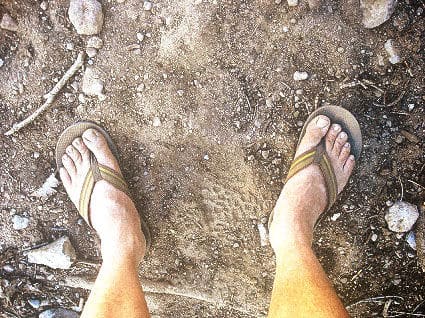The Humble Significance of Feet
“Feet!” someone said when I asked for a good blog topic. They meant it sarcastically. But I thought about their choice. It was a good one.
Feet, suggests Paul, are not a very glamorous part of the body. (1 Cor 12:15) Some people like to talk about their ‘best feature.’ Hardly anyone, I would think, says feet. But as we marvel at such things as ‘hand models,’ who sell things such as wristwatches and rings, there must be ‘feet models’ who sell sandals and such like.
So there must be nice feet out there, however peculiar that sounds. But in general, feet are not one of our most treasured attributes. I have heard many people complain about their noses. Eyes are the focus of a great deal of attention, praise and poetry.
The eyes are the windows of the soul, it is said, which is a sort of redaction of the dominical saying, which most modern translations render, “The eye is the lamp of the body.” (Mt 6:22)
Eyes are often treated in literature as the very manifestation of good or of evil in a person. A bad person cannot have nice eyes in literature. And yet, who is unaware that the devil can change himself to appear as an angel of light? Surely this must include the eyes? Eyes are important, though, regardless of the romanticism to which literature subjects them. I know this because of my four-month old.
She does not smile (usually) when she sees my feet or my hands, but when she sees my eyes. And, when I make a dramatically frowny-face to my preschoolers, they shudder in horror! Then my eyes and mouth are contorted in an unnatural way. And yet, somehow they—somehow even the infant—can draw meaning from these facial expressions. It’s not unnatural at all!
Feet, Service, and the Theology of the Body
That’s what the Theology of the Body is all about: the idea that the body is itself an icon of God. It was long recognized that the soul is such an icon, the primary way in which it can be said that we are made “in the image and likeness of God.” St. John Paul wanted to emphasize that the body is too. That was his gift to theology. If the body is an icon it is imbued with meaning.
But we are talking about feet here. What aspect of God can these unlikely appendages exemplify? Of course, we have all heard about the “Footprints” story of Christ carrying the man in times of trouble, which was represented by the single set of footprints in the sand. That’s not from the Bible, but it’s a pretty wise story nevertheless. In this story footprints represent one’s life history. The feet must themselves, then, represent one’s actions, or one’s journey through life.
That’s a fairly ‘biblical’ view of feet, I would argue. Feet are, understandably, depicted as the workhorses of the body. But a workhorse is not a stallion, a thoroughbred. They are more like the donkey upon which the Blessed Virgin travelled to Bethlehem or upon which the Lord travelled into Jerusalem. No one cheered for the donkey on Palm Sunday. But, like the woman who anointed the Lord’s feet with expensive ointment, the donkey is remembered by those who cherish the story of Salvation.
Like donkeys, feet were the tried-and-true way to get places in Biblical Times. But unlike today, they were actually paid attention to. They were far more valuable a commodity back then, I’d argue. Today it’d be better to have fingers with which to type at a keyboard than to have feet – that is, if you had to choose. Feet don’t quite serve the same vital purpose today as they did then. And yet then, as now, feet never garner the same degree of respect that the eyes do. Today far more goods travel by truck than by airplane, and yet which one plays a more prominent role in fiction?
Perhaps the Lord wanted us to think otherwise about feet. Is this possible, or am I confusing the symbol and the thing the symbol is meant to symbolize? That seems to be the more obvious interpretation. Jesus certainly referred to feet on more than one occasion. He emphasized the importance of caring for others and, here and there, he illustrated how one might do this through the washing of the feet. I would say that feet in the body of our neighbor play the same role as ‘the lowly’ do in society. Jesus was all about the lowly. So was His Mother. (Lk 1:52) Jesus was always putting lowly things front-and-centre wasn’t He? Like bread, donkeys, oil, and water.
When Paul talks about the Body of the Church, he makes a distinction between the weak parts and the honorable parts. (1 Cor 12) And yet his point was to mitigate the centrality of this distinction. Yes, this distinction was a real one in life, and yet, he wanted to let us know that, especially when it comes to the Church, there are no unimportant parts. I am humbly reminded of the place in which he puts teachers when he lists the ‘jobs’ in the Church. Teacher comes in third. (1 Cor 12:28) It is the one to which I have dedicated my life, but I am not Apostle; I am just a teacher.
Becoming the Foot in Spiritual Life
We all grew up being taught there were important people in the world and unimportant people. Nor does the secular cliché that ‘everyone is special’ do much to offset the more fundamental fact. Doctors, politicians and celebrities are the important ones that we are taught to admire.
And yet I want to make a case for the foot. In my years of service to the Church, I have noticed a few things about who are providing the crucial services. The first person I noticed was the sacristan – you know, the guy or girl who lays out all the linens and generally makes sure everything is in place for mass. The second person I noticed was the secretary. Twice I have been the secretary of a church, believe it or not.
This was a position with a steep learning curve. And this was the person—usually a woman—who was hardest to replace in a church, and many other places of business. But the Church isn’t just a business, but a spiritual community. And so on the spiritual side of things it is the ‘old rosary ladies’ who were the spiritual workhorses of the parish. But do they get the credit they deserve? Does the secretary, does the sacristan?
I am going to be blunt: in your spiritual life you need to strive to become the foot. You need to strive to become like the three people I listed above: the sacristan, the secretary, the old rosary lady. This might radically reform your view of service. In the family it is not the dad with the flashy profession who is the best dad. It is the dad who works hard and yet who is available day-in-day-out to his wife and kids. It is not the mother who is also a professional whatever.
No, it is the unpraised, unpaid, unglamorous mother who seems to always be in her pajamas or sweat pants, hauling laundry and changing diapers who is the foot to be modelled after. Canada has St. Andrew Bisset who was our spiritual foot. He was the mere doorman of his monastery. And, as I mention people I encounter in their service to the Church, like sacristan and secretary, at my favorite monastery where I like to take my retreats, it is the doorman there who always helps me the most.
When building something, getting the footings right is crucial to everything else. Jesus talked about Himself as the cornerstone. The bottom is not a bad place to be. Christians should be struggling to get there. Are you important enough to be at the bottom? Whatever it is you actually do, do it like the foot does it.
The foot works hard and never speaks about itself, never promotes itself, never struggles to get ahead. It is not ambitious; it is dependable. It doesn’t make itself indispensable for prudential reasons; it does so to build up everything that is truly important. The foot has never caused a war or perpetrated an injustice. The foot makes difficult things possible, through persistence, dependability, fidelity and hard work. Everyone can be a foot in their own way. The foot is the very opposite of what gets noticed, and that is not a road for the weak.

Colin wrote this Article for the Knights of the Holy Eucharist. He has been married to Anne-Marie since 1999, and they are proud to raise their six children, in a small town in Ontario, Canada. Colin has a PhD in Theology and works tirelessly to promote the Gospel. “Just share the Word,” is what he believes the Lord says to him – and so he does. He recently founded The Catholic Review of Books, a printed journal and website dedicated to “all things books” from the perspectives of faithful Catholics. He is fascinated by the concept of chivalry as it applies to being a man and a father in today’s crazy world.

